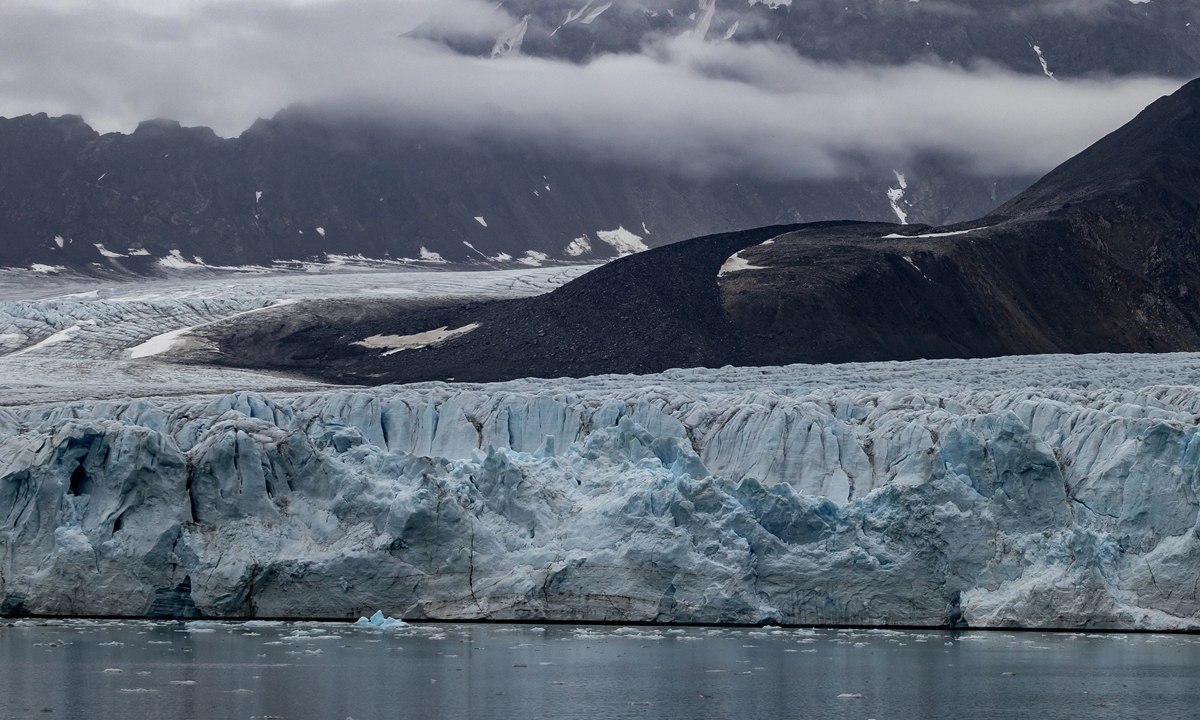COMMENTS / EXPERT ASSESSMENT
GT Voice: West can't merely seek climate actions from developing world

A view of fiords as they melt due to climate change near Svalbard Islands, in the Arctic Ocean in Norway on July 19, 2022.Photo:VCG
As the 28th session of the Conference of the Parties (COP28) to the UN Framework Convention on Climate Change in Dubai draws closer, Western efforts to exert pressure on others and pass the buck appear to be ramping up.
Wopke Hoekstra, EU commissioner for climate action, said China and other big developing nations must pay into a fund to rescue poor countries stricken by the climate disaster, as there was no longer any reason to exclude big emerging economies with high greenhouse gas emissions levels from the obligation to provide aid to the poorest and most vulnerable countries, The Guardian reported on Sunday.
If these comments represent the West's main stance at the upcoming climate summit, then there's reason to fear that global climate change may face an alarming future. It means that the West will continue to point a finger at developing countries from a moral high ground, instead of focusing on its own responsibilities and honoring its commitments.
When countries joined the UN Framework Convention on Climate Change in 1992, the international community reached a consensus that developed and developing countries should bear common but differentiated responsibilities for reducing emissions, as climate change is mainly the result of an accumulation of greenhouse gas emissions generated by developed countries during the long industrialization process.
This is the fundamental reason why the West pledged funding and technology assistance to help developing countries meet their climate change challenges.
But the reality is that Western economies, which should bear greater responsibility for the climate crisis, have failed to live up to their promises and reflect on their actions that conflict with climate change efforts. Instead, they have targeted emerging economies including China in a brazen attempt to coerce developing countries into giving up development.
The picture of global climate change is far from optimistic given the current progress. Through the end of September, the daily global average temperature exceeded 1.5 degrees Celsius above mid-19th century levels on 86 days this year, ABC News reported, citing UN Environment Programme's Emissions Gap Report 2023. The report called for countries with greater capacity and responsibility for emissions to take more ambitious action and support developing nations as they pursue low-emissions development growth.
Similar calls have been made many times and have so far failed to impress or prompt the West to fully deliver on its climate promises. For instance, developed nations have pledged $100 billion in annual funding to help developing countries reduce emissions and manage the impacts of climate change. More than a decade later, they have not yet met the goal.
Whether or not the West can deliver on the promise, the scale of the promised aid is far less than the damage done to the environment. Given the dire climate consequences the West has caused, it is in no position to teach others on climate issues. Climate change needs efforts by all countries. If developed economies only intend to pay lip service and shift the burden of reducing emissions to other economies to slow down their development, then there will be no real cooperation but more conflicts of interest.
When it comes to climate change, China's attitude has always been clear and consistent. The pursuit of green development is our own demand, and how we will achieve our goal will not be affected by outside pressure or challenges.
China is already the world's important developer, user and investor of renewable energy. China's total installed capacity of hydro, wind and solar power has been on the rise, with some types of renewable energy generation now the world's largest. This is the most compelling proof of China's efforts toward its emission reduction goals.
Last but not least, whether the upcoming meeting in Dubai can achieve tangible results will depend on whether countries can reach a strong alliance on pushing for renewable energy cooperation, which needs to move beyond geopolitical divides. Given the severe situation, the world needs more actual climate actions than geopolitical power plays.
